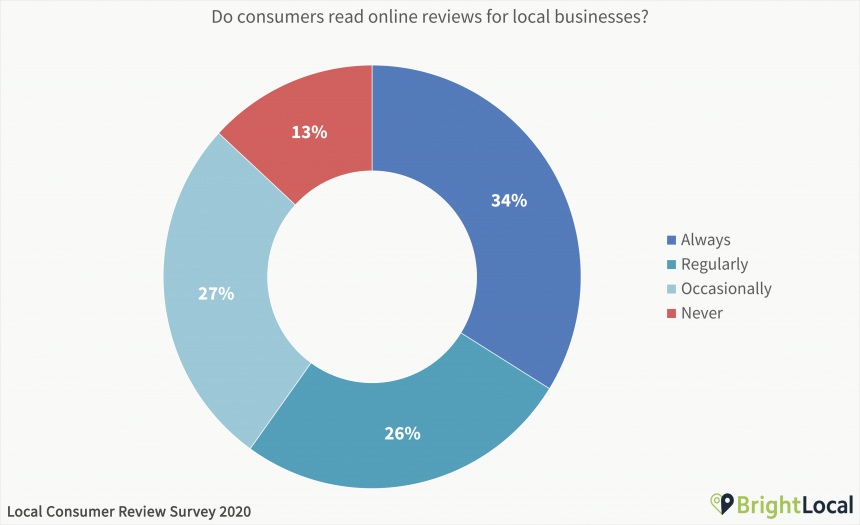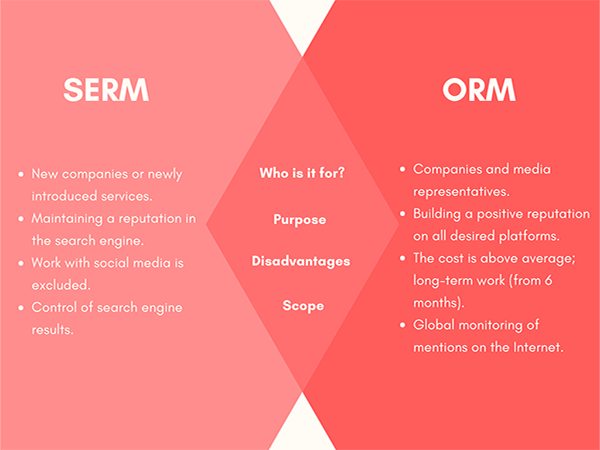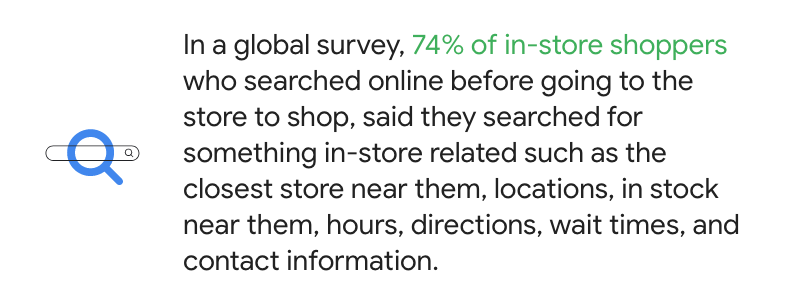Sep. 30
What is reputation management, and how can it benefit your business?
We live in an era of active audiences where people often express their opinions about brands and services across different platforms. By managing your reputation and having a solid reputation management strategy, you can minimize negative customer reviews. But this is not enough, and it is essential to simultaneously increase the share of positive reviews and constantly do many other things to maintain your reputation. This is a complex and ongoing process.
A company’s reputation affects both the number of clients and business partners and the business’s success as a whole. Today, various effective technologies and strategies allow confidently managing a reputation, one of which is reputation management.
Online reputation management is about influencing how people perceive your business. In simple terms, control over the information that appears when people search for your brand, products, or services on the Internet.
The idea behind online reputation management is to form a positive opinion about your activity by working with reviews or comments. As a result, it will enhance credibility, and thereby more people will buy your products or services.
How important is online reputation management for business?
Online reputation management identifies, mitigates, eliminates harmful content on the Internet, and creates and promotes positive content. Well-planned reputation management shows the good side of your company. And this, in turn, attracts and makes loyal your customers and future employees who come to you for an interview.
It is recommended for both small and large companies, both new and those who have been on the market for a long time. And special attention should be paid to large brands. After all, the more famous the brand, the more people talk about it, and accordingly, you can find more negativity.
Statistics show that:
– 93% of users say online reviews influence their decisions;
– also, 90% of users say they look at reviews before visiting a company;
– 85% of consumers trust online reviews more than personal recommendations;
– 75% of CEOs believe that reviews, comments, posts are essential to their financial and reputation status;
– 68% of buyers are willing to pay 15% more for the same product to companies with an excellent online reputation.
To increase brand value and reputation influence, working with a digital reputation helps create a company’s positive image. Thanks to user reviews, you can expand your unique selling proposition, improve your product or service.
And only sincere customer feedback will help determine the value of the business in the market. Below you can see how often consumers read online reviews for local businesses, according to BrightLocal researches.

Reputation management remains the primary factor in increasing sales and revenues. Working with comments and customer reviews can help influence other people’s buying decisions. Most potential buyers go through product reviews before buying, and half of them purchase based on positive reviews.
How to work with online reputation management?
All online reputation management methods are closely related, and the most outstanding efficiency can be obtained by combining them. A valuable thing to undertake will be using the Search Engine Reputation Management, or, to put it shortly, SERM.
In simple terms, SERM refers to several measures to create a positive image of the company in the eyes of potential customers.
First of all, SERM is aimed at controlling brand queries – keywords containing a mention of the promoted object. In addition, they track all of the top 10 (top 20) associated SERPs. The difference between SERM and ORM is that online reputation management works on improving the reputation in the network as a whole: on your own website, on thematic resources and review sites, on social networks, on forums, etc.
SERM’s area of responsibility is search results. Of course, in the process of implementing an SEO strategy, you need to work with content on different resources. But the emphasis is on promoting the correct queries.

Users form an opinion about a company by the content they see on the first search page. After all, all the most popular, the main thing is located here. These are fresh reviews, news, the address of the company, its contacts.
According to the statistics, 74% of in-store shoppers searched online for something they wanted to buy before going to the store.

And 59% of shoppers used Google search to find purchases they plan to make in a store or online, which indicates that no business can afford to appear dubious in search results.

While SERMs only interact with search engine algorithms, ORM specialists respond to user reviews, neutralize negativity preventing bad reputation, and also respond to positive reviews to show the brand’s interest in feedback.
So how do you exactly fight negative reviews?
Harsh complaints, negative comments, and low ratings can seriously damage a company’s or a business’s reputation and scare off potential customers. Even anonymous Internet users will tarnish the name.
People leave complaints in the hope of getting a response, and this is mainly due to negative experiences with the service or product. And the users themselves generally offer you to correct or explain everything, but not all commentators receive their answer.
It should be understood that reviews vary. Therefore, first of all, you must learn to distinguish between them. For example, clients might accuse you of a case. This includes employees who are rude to customers, as well as overdue orders or poor quality services.
To determine the strategy for working with reviews, you need to specify their type, and to help you with this, we’ve highlighted the most popular ones.
- A genuine customer review. It was left by a real client, where he justifiably criticizes the work, after which the author is waiting for a solution to his problem.
- Fake reviews. Competitors or fired employees are often leaving these. But they have one goal – to kill the company’s reputation.
- Emotional review. The author expresses himself expressively, emotionally (especially when using exclamation points), but some specifics complaints are absent.
- Trolling. This type of review can be from a real customer trying to get attention without certain claims against your company.
To cope with negative reviews, first of all, make sure they don’t go unanswered. If you want to maintain a brand’s reputation, you should consider a reputation management strategy that involves meeting customer requirements.
Don’t be afraid of negativity. You need to work with it. Below are several tips on how to sort out negative comments:
- Know how to distinguish criticism from outright provocation. Continuous work with reviews, review texts analysis, and requirements for details from customers will help you to discern them;
- Never insult the client. When responding to negative comments and reviews, stay calm, don’t get emotional, or worsen the situation.
- Never make excuses. The more you accuse someone, the more you look guilty.
- Be sure to answer. Without a quick response, there will be more problems.
- Never delete a customer comment without resolving the problem;
- Communicate with clients on an equal footing and solve their issues promptly.
Encouragement to write a positive review.
As is well known, customers rather leave negative reviews than positive. It is considered normal when a person receives services or goods that meet his requirements, and in this case, reviews are rarely left.
Therefore, it is essential to thank for the positive feedback: establish feedback with the client – he will return to you or advise you to friends. And if you could not immediately respond to a positive comment, you should respond and apologize for the late response.
There are different ways to motivate consumers to leave a positive review.
- Start with the obvious: immediately ask the customer to share their impressions as soon as you close the completed order.
- The other efficient method, but a bit expensive, is a customer’s gift, bonus, or discount;
- An email newsletter is a simplest but ineffective method. Mail is not checked immediately after purchase, and some never enter their mailbox;
- SMS-mailing should be sent immediately because the more time passes, the sooner they will forget about you;
- In-app push notifications are suitable if your business has a mobile app. You can also use ready-made mailing applications (for example, OneSignal).
You can use all the methods altogether, but be sure not to overdo it. It is necessary to find a middle ground not to provoke aggression and to be forgotten.
What reputation tools to use?
There are plenty of reputation tools to track your company’s reviews. These tools are an excellent option for structuring small businesses’ reputation management, reputation management for local businesses, and for business owners in general.
- Yelp is a website for finding services in the local market, such as restaurants or hairdressing salons, with the ability to add and view ratings and reviews of those services. There are hundreds of reviews for favored businesses, and the site provides elements of a social network for reviewers.
- Google My Business – the most reliable review service in which you post information about the company to users of the search engine and Google Maps navigator. You can create a card of your company and branches in Google Maps, where users will be able to see primary data about your company.
- Tripadvisor is a platform that has collected millions of travel reviews for places and properties. You will receive recommendations on where to stay, what to do, and where to eat.
- Amazon is a kind of symbiosis that combines both traditional trades. The company itself acts as a seller and provides a place for trade to third-party sellers and urges buyers to leave reviews and ratings after each buying.
- Facebook is one of the most popular social media platforms, where people can leave reviews and ratings about brands, products with ease.
The importance of Social Media Management.
For online reputation management, it’s not enough to just be online to improve your digital reputation. You must have an active blog, social media, and presence on other platforms to keep in touch with your audience.
Users are more willing to learn new information, leave comments, repost, etc., through social media. Although the size and content of social media posts are minimal, they are ideal for short news stories, announcements, initiating discussions, etc.
We recommend:
– Regularly publish content that will be useful to potential customers;
– Comment on user posts related to your brand;
– Initiate discussions. This has a positive effect on loyalty and will help grow brand advocates;
– Create an expert blog where you can share your opinion and cover relevant topics.
Social networks help build long-term relationships with the target audience. With its help, they attract potential customers and retain existing ones. For example, companies that have a blog get 55% more visitors.
Although social media help you to build a good relationship with your audience, if you don’t use them correctly, they can also damage a company’s reputation.
Here are the most common social media mistakes that can ruin a company’s image and give it a bad reputation:
- Persistent sales tactics. The endless publicity and hype for your product or service will only piss people off and send them somewhere else.
- Too many posts. Excessive content floods your audience with more information than they want. If you overdo it, the audience will be overwhelmed and annoyed.
- The other end of the spectrum is low or no activity. If there’s no information – there are no subscribers.
- Watch your words. Even in response to harsh statements, it is better not to worry but to choose words and expressions correctly.
- Don’t ignore complaints. A quick response to complaints will show that the business cares about the customers.
- Track comments. It is challenging to notice and smooth out corners in harsh comments in time if you have to monitor more than one social network, but several. Here are some reputation tools to track reviews on social media: Avario, Google Alerts, SentiOne, Meltwater;
- Bad grammar and bad taste. Always double-check your posts for spelling and grammatical errors before posting them online.
All in all, social media success isn’t easy, and if you’re not committed enough, you can easily make one of these mistakes. However, if you put in enough effort, it is not so difficult to avoid them.
Is online reputation management worth the money?
Online reputation management covers a wide range of complex works on reputation management. Whether those are small business owners who need a strong reputation management strategy, or you need a reputation for entrepreneurs, or you want to be a big brand, or you already are a big brand, or you’re a media personality. The complex provides for all areas of formation and protection of a positive image of a brand, service, or person.
If the above is unconvinced, ORM is worth money if:
- Your sales and profits are falling. Advertising brings fewer and fewer customers, and you are looking for new channels.
- Difficult to attract employees. Your requirements for new employees have increased, but professionals are not responding to your vacancies.
- You want to outperform the competition. Your potential customers choose your competitors, not you.
Another question is how much reputation management costs?
To estimate the cost of work, you need to understand the situation as a whole. It is influenced by the starting factors, the volume of the project, the duration of the required activities, the number of employees involved. For this, a reputation audit is always carried out before submitting the estimate to the ORM. Mostly, the reputation analysis is free. The price is formed based on an analysis of what values can be most effective for your business.
After receiving information on what work should be done, in general, we can say that the monthly cost of reputation management ranges from $500 to several thousand of dollars, and the work itself can take 6 months or more.
How do you choose an online reputation expert?
Online reputation managers are engaged in creating and maintaining a positive image of the company, as well as its restoration and protection in crisis situations and have a broad range of tasks such as SEO, content development and content management, work in social networks, management of online reviews and ratings, monitoring of brand mentions on the network.
When choosing reputation management services, pay attention to:
- The presence of successful cases;
- The readiness of the team for personal meetings and phone calls (it is not necessary to have a personal meeting, you can arrange a remote call);
- Providing a detailed work plan for your project;
- Their own reputation is good. If they have sufficient authority and the clients are satisfied with the work of the team, then such specialists can be more confidently entrusted with their business;
- The agency does not guarantee quick and permanent results. A reliable ORM agency will be honest with you and does not guarantee a quick result. The work on creating an organic image takes from 6 months;
- Transparency at every stage of cooperation. Before launching a project, the agency should provide you with an audit showing the strengths and weaknesses of your current reputation. In addition, the company should provide you with weekly or monthly reports that will indicate what has been done and what results these actions have brought. In short, a good agency is transparent in its actions at every stage of work.
ORM is an essential part of a marketing strategy for any business. They will always talk about you. The main task of the online reputation department is to develop a solid strategy.
1MDE agency will structurally build the necessary reputation, provide high-quality PR in online media, exclude image risks, and also ensure effective interaction with the media and the expert environment.
Remember that it’s never too late to work on improving your reputation, but it’s best not to leave it to later. It’s always best to start early, even if you are just entering the market, so you have a better chance of protecting yourself. It is always easier to build a reputation before problems arise than to deal with negativity and its consequences.
Similar articles






